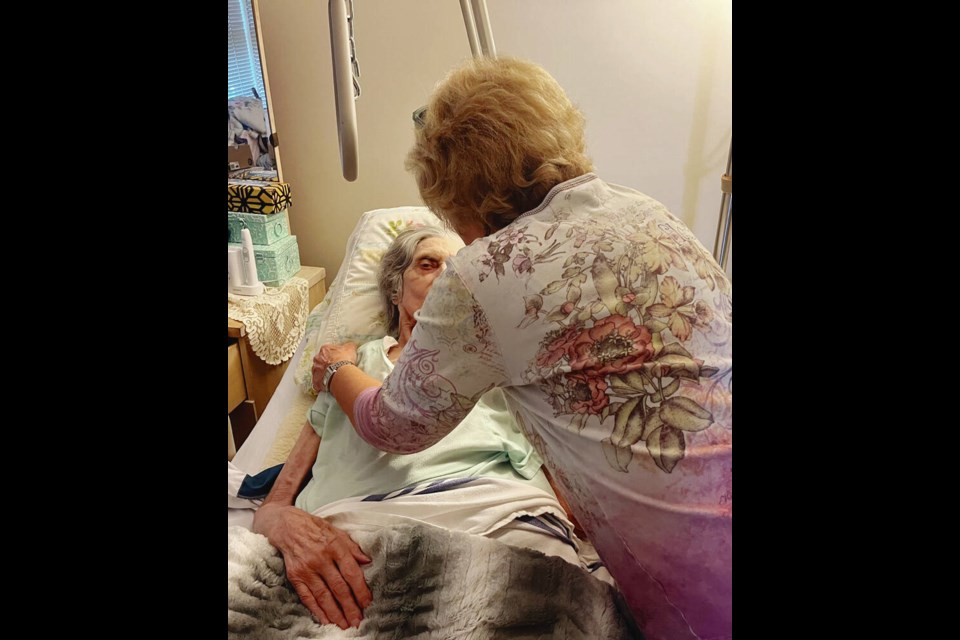A Saanich family doctor whose terminally ill mom was left lying in bed helpless when a home-support worker didn’t show up says seniors must be better supported to live independently or to die at home with dignity.
Jennifer Lush said her mother, Marianne Lush, 86, who is largely blind and was left paraplegic after a medical procedure 14 years ago, has chosen to die at home after being diagnosed in August with inoperable colon cancer.
She is supposed to have home-support workers to help her get in and out of bed. But on Thursday, the support worker didn’t arrive for a 7 a.m. to 2 p.m. shift.
Lush said she discovered the situation when she dropped in for a coffee before her shift.
“Nobody called me,” she said, noting her mother is too frail and her eyesight is too poor to use a phone.
“If I hadn’t gone, if my mom didn’t have a daughter who advocates for her and is involved in her care, my mom would have missed all her medication, she would have been left lying in bed with no ability to get up, and she would have been in horrible pain.”
The health authority and home-support company are supposed to be notified when a home-support worker is sick or can’t make a shift, but that didn’t happen, she said.
“And it worries me how many seniors in our community this might be happening to, you know, if they don’t have family members to advocate for them,” said Lush, whose sister is a nurse on the Lower Mainland.
“When a senior who has two daughters in the health-care system to advocate for her, and whose visits are listed as ‘critical’ priority, is falling through the cracks, I shudder to think what is happening to the majority of B.C.’s seniors in the community.”
Lush said another shift was missed on Sunday.
On Tuesday, the scheduled worker wasn’t available but the shift was covered and Lush was notified, she said.
Lush said she was told that one part of the problem is inequitable compensation because the same type of workers in hospitals and long-term care are better paid.
Marianne Lush is an Island Health client and the health authority subcontracts to Sidney Senior Care for home-support workers to do hours they are not able to do.
Shauna Dorko, owner and CEO of Senior Care Group of companies with more than 100 home support workers through the capital region, including Sidney Senior Care, and the Gulf Islands, said Marianne Lush was left without scheduled home support services on Thursday because of a “communication error with our worker.”
Had the company known the worker, who was sick, wasn’t able to show up for her shift, a replacement would have been sent immediately, said Dorko. “We always have people to send,” she said. “Sometimes there’s communication errors and this was one of those times.”
As for Sunday’s missed shift, that was a “misunderstanding” with Island Health, she said — the company didn’t know it was needed to fill a shift for the health authority.
Lush says staffing shortages in home support have been evident in the last couple of years.
Dorko said the company always has candidates applying for jobs because they offer competitive wages, but with an aging population, there is also a greater need for home support. “There’s never a shortage of work,” she said, “but there’s always people applying to us.”
B.C. Seniors Advocate Isobel Mackenzie issued a report in 2019 called Home Support… We Can Do Better, she noted home-support services in B.C. are too expensive for most seniors, do not do enough for high-need clients, and are staffed by people who are 75 per cent casual or part-time.
Home support can include services such as bathing, dressing and meal preparation, and is meant to extend the time that seniors can live independently before moving into long-term care.
When more than 60 per cent of seniors are entering long-term care having received no home support in the months leading up to the placement and 62 per cent of family members are in distress, “it is time to ask how effective the program is at assisting B.C. seniors to live at home,” she said.
In 2019, Mackenzie estimated fifteen per cent of long-term care residents — accounting for about 4,200 beds — could still be living in the community.
On Tuesday, she suggested not much has changed. “It certainly hasn’t gotten better.”
The seniors advocate has another report due out before the end of the year on home support and she said it will look at cancellations. “I don’t want to pre-empt the report, but I think it’s clear that the staffing challenges in the health-care system have not escaped home support,” said Mackenzie.
“Home support has always been the poor cousin, if you will, to long-term care.”
An hourly rate that is less than for some of their counterparts in facilities, combined with part-time hours, exacerbates the labour shortage that many sectors are currently experiencing, she said.
“So many home support workers are casual,” said Mackenzie. “You need a whole bunch of people for this three-hour block in the morning and then you don’t need them for the rest of the day and it’s a problem.”




